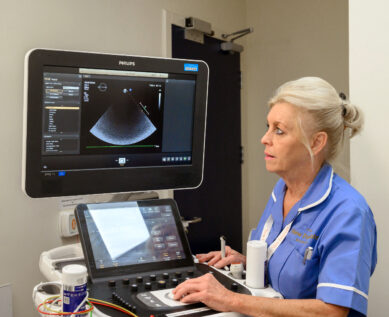What Happens During the Test?
- Initial Echo: You’ll begin with a resting echocardiogram to capture baseline images of your heart.
- Exercise or Medication: You will either walk on a treadmill (gradually increasing speed and incline) or receive a medication to stimulate the heart’s workload.
- Monitoring: Throughout the test, your heart rate, blood pressure, and ECG will be closely monitored.
- Post-Stress Echo: A second set of ultrasound images will be taken immediately after stress is applied to compare heart function.
The entire process takes approximately 45 to 60 minutes.
Is it Safe?
Yes. A Stress Echocardiogram is considered very safe and is performed under close medical supervision. You may feel breathless or tired during the test, but serious side effects are extremely rare. Our team is fully trained to ensure your safety throughout.
What Can a Stress Echo Diagnose?
This test helps assess:
- Blocked or narrowed arteries (ischaemia)
- Heart muscle performance under stress
- Heart valve function during exertion
- Post-surgical recovery and response to treatment
It can help guide decisions about further treatment, lifestyle changes, or medication adjustments.
How to pay
You can self fund treatment, or pay through your medical insurance:
For those with an insurance policy which covers most medical conditions (many do).
For people choosing to fund their own diagnosis and treatment.
Why Choose The New Foscote Hospital?
- Advanced Cardiac Testing in a comfortable, modern setting
- Experienced Specialists in cardiovascular diagnostics
- Fast Appointments, with minimal waiting times
- Personalised Care – no referral needed to begin your heart health journey
- Transparent Pricing and insurance support.
Whether you’re referred by your GP or accessing private diagnostics directly, we’re here to support your heart health.





